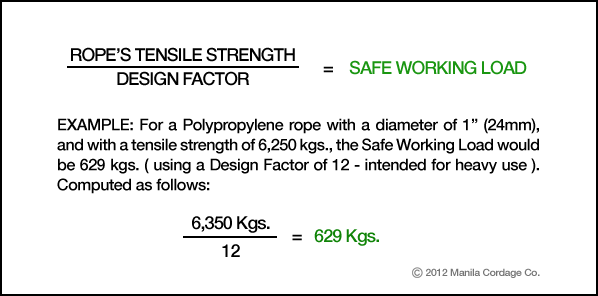|
Understanding
SAFE WORKING LOADS
Because
of the wide range of rope use, rope condition, exposure to
the several factors affecting rope behavior, and the
degree of risk to life and property involved, it is
impossible to make blanket recommendations as to working
loads. However, to provide guidelines, working loads are
tabulated for rope in good condition with appropriate
splices, in non-critical applications and under normal
service conditions. In the US specs (CIS), a general
recommendation is mentioned which states a Safe Working
Load factor of 5 to 12 for PP rope. In other words, for a
12” circ. PP rope with a minimum tensile strength of
102,000 kgs., the working load should be computed by
dividing the tensile strength by the factor of 5 to 12, to get the safe working
load range of 24,000 kgs. to 8,500 kgs. The factor of 12 is
used when the application is considered more critical.
Again, this guideline does not cover exceptional
conditions such as shock load, sustained load, etc. and is
for rope in good condition with appropriate splices, in
non-critical applications and under normal service
conditions.
 |
Working loads should be exceeded only with expert
knowledge of conditions, and professional estimates of
risk. Working loads should be reduced where life, limb,
or valuable property are involved, or for exceptional
service conditions such as shock loads, sustained loads,
etc. A higher working load may be selected only with
expert knowledge of conditions and professional estimate
of risk and if the rope has not been subject to dynamic
loading or other excessive use, has been inspected and
found to be in good condition and is to be used in the
recommended manner, and the application does not involve
elevated temperatures, extended periods under load, or
obvious dynamic loading.
You should not use a rope at high working loads if it has
previously experienced excessive use, high dynamic
loading, sustained loading for long periods or high
temperatures. For all such applications and for
applications involving more severe exposure conditions, or
for recommendations on special applications, consult an
expert in the specific field where the rope is to be used.
Dynamic loading voids working load. Working loads are not
applicable when rope is subject to significant dynamic
loading. Wherever a load is picked up, stopped, moved or
swung there is an increased force due to dynamic loading.
The more rapidly or suddenly such actions occur, the
greater this increase will be. In extreme cases, the
force put on the rope may be two, three, or even more
times the normal load involved. Examples could be picking
up a tow on a slack line or using a rope to stop a falling
object. Therefore, in all such applications as towing
lined, lifelines, safety lines, climbing ropes, etc.,
working loads as given do not apply.
The Working Load guidelines are not necessarily applied
in those applications where a thorough engineering
analysis of all conditions of use has been made, and that
these conditions will not be exceeded in service. In such
cases tensile strength, elongation, energy absorption,
behaviour under long term or cyclic loading and other
pertinent properties of a rope may be evaluated to allow
the selection of the rope best suited to the requirements
of the application and an analysis of any risk involved in
its use.
This information is intended as a guide only. As
mentioned, for critical applications, a thorough engineering analysis of all
conditions of use should be made specific to the
application to assure that the ropes are well suited for
the job and/or to inspect the current state/condition of
the rope in use.
Legal Disclaimer
Although we believe that the information supplied is
generally correct, we do not assume any responsibility whatsoever for
its accuracy. The data and information contained in the electronic
catalog are intended for use by persons possessing technical skill and
knowledge. Conditions of use of the items listed in the electronic
catalog are beyond our knowledge or control and consequently we assume
no liability whatsoever for results obtained or loss or damage incurred
as a result of application of the data or information presented. Users
of the electronic catalog do so at their own risk. In addition, we
assume no liability and make no warranty with respect to claims of
patent, trademark or copyright infringement or other similar claims
which may arise out of or in connection with the use of any data,
information or items listed in this electronic catalog.
MANILA CORDAGE CO. EXPRESSLY DISCLAIMS ALL
WARRANTIES, EXPRESSED OR IMPLIED, INCLUDING BUT NOT LIMITED TO IMPLIED
WARRANTIES OF MERCHANTABILITY AND FITNESS FOR ANY PARTICULAR PURPOSE. IN NO EVENT SHALL MANILA CORDAGE CO. BE LIABLE FOR
ANY INJURY, EXPENSES, PROFITS, LOSS OR DAMAGE, DIRECT, INCIDENTAL, OR
CONSEQUENTIAL, OR ANY OTHER PECUNIARY LOSS ARISING OUT OF THE USE OR
INABILITY TO USE ANY PRODUCT DESCRIBED IN THE ELECTRONIC CATALOG.
|